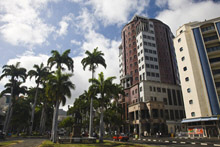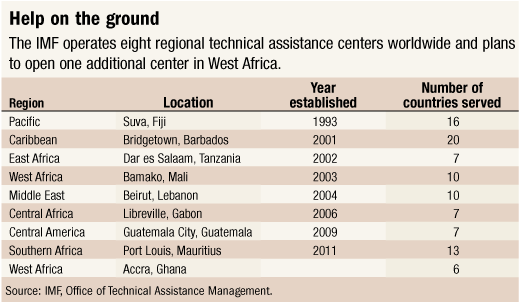
Typical street scene in Santa Ana, El Salvador. (Photo: iStock)
IMF Survey: IMF Opens Center to Help Build Capacity in Southern Africa
October 17, 2011
- Hub to serve countries generating about half of sub-Saharan Africa’s output
- Centers support macroeconomic policy design, implementation
- Governance of centers reviewed by independent evaluations of activities
Aiming to further help African countries build capacity to design and implement reforms that support poverty reduction, the IMF opened a new southern African technical assistance center in Mauritius.

Port Louis, Mauritius: location of eighth IMF center around world to transfer economic skills, best practices and to train officials (photo: Walter Bibikow/Newscom)
IMF TECHNICAL ASSISTANCE
The IMF’s Africa Regional Technical Assistance Center South, which formally opened October 17, is the eighth center set up by the IMF around the world to transfer economic skills and best practices and to train officials—thereby building countries’ policymaking capacity.
IMF Deputy Managing Director Min Zhu, speaking in Port Louis at the opening of the center, stressed the importance of capacity building on a growing continent such as Africa. “Capacity building is critical for effective fiscal institutions, sound financial sectors, and robust macroeconomic statistics, which eventually all contribute to economic performance,” Zhu said.
Zhu stated that strong institutions are critical for sound macroeconomic management and ultimately for economic development and inclusive growth. “Strong institutions are run by well trained individuals with the right skills and appropriate authority. Adequate capacity building thus promotes strong institutions with capable human resources, empowered with relevant know-how,” Zhu said.
The Mauritius regional center is the fourth to be established in Africa. It joins regional assistance hubs opened in Dar es Salaam, Tanzania in 2002; in Bamako, Mali, in 2003; and in Libreville, Gabon, in 2007 in serving a total of 38 African countries. A fifth African center is planned for Accra, Ghana (see table).
Successful model
The IMF’s regional technical assistance centers are widely considered a successful model for capacity building by the international community. A key component to this success is that the technical assistance delivered through these centers is demand driven, responding to the needs of countries, and is closely connected to their poverty-reducing strategies.

Technical assistance services offered by the centers both complements and supplements the technical assistance provided by IMF headquarters and is coordinated with assistance provided by other donors. The centers provide a natural platform for harmonization of regulatory frameworks, and adoption of best practices, as well as overall economic integration.
The African regional assistance centers are part of the IMF’s Africa Capacity Building Initiative launched in May 2002. Responding to calls from African leaders, the initiative helps strengthening the capacity of African countries to design and implement their poverty-reducing strategies, as well as to improve the coordination of capacity-building technical assistance.
The African regional centers provide technical assistance on a grant basis. They are financed by contributions from the beneficiary countries, bilateral and multilateral donors, and the IMF.
The centers support the implementation of countries’ poverty-reducing strategies in the areas of the IMF’s core expertise: macroeconomic policy, revenue policy and administration, public financial management, monetary policy and operations, financial sector supervision, macroeconomic and financial statistics, and macrofiscal analysis.
Ownership and accountability
The governance of the centers is designed to promote ownership of, and accountability for, capacity-building programs. Accordingly, each center is guided by a steering committee for the development of technical assistance strategies and priorities. Beneficiary countries have the majority of the seats on the committee. The committee endorses the center’s annual work plan and provides high-level guidance on strategic issues, such as emerging capacity-building needs in the region.
The governance of the centers is further enhanced by periodic independent evaluations of their activities. Independent external evaluations have consistently given the African technical assistance centers high marks for the quality of their expertise, their rapid and flexible service delivery, and their responsiveness to member countries’ needs.
The African regional assistance centers have experience and expertise to help member countries in
• Strengthening government institutions and central banks, which are critical to promoting sustainable economic growth. Public financial management reforms remain important to make the use of public resources more efficient and transparent; strengthened macrofiscal analysis and reporting allow better planning and monitoring of resources available for pro-poor spending;
• Deepening financial intermediation to support a strong private sector. Well functioning interbank money and domestic debt markets are critical to buttress development strategies; strengthening statistical capacity promotes sound macroeconomic analysis, policy implementation, and delivery of better information to the public; timely and reliable statistical data help explain macroeconomic developments and the design of appropriate policy responses; and
• Making progress in regional integration and harmonization. Most African countries belong to regional organizations, which often seek to create customs and monetary unions. Regional assistance centers can assist in enabling cross-border trade, and in standardizing and harmonizing statistical data to allow comparability; they can also foster regional integration through peer review.
Diverse group of countries
The Mauritius center will serve a diverse group of countries that generates about half of sub-Saharan Africa’s GDP. Several of the middle-income countries in the region have relatively strong government institutions, as well as a good track record of policy implementation and lasting growth. Lessons from those experiences could be an important input for the center’s work, as well as a reference point for assessing the other countries’ technical assistance needs and priorities.
At the same time, knowledge of best international practices could be an asset for the center to engage with upper middle–income countries in such specialized technical assistance areas as exhaustible resource management and supervision of bank and nonbank financial intermediaries.
In the case of the region’s lower middle–income and low-income countries, which need help on a broad front, technical assistance and institution-building support may focus on public financial management, monetary and exchange rate policies and operations, supervision of financial institutions, and economic statistics.


